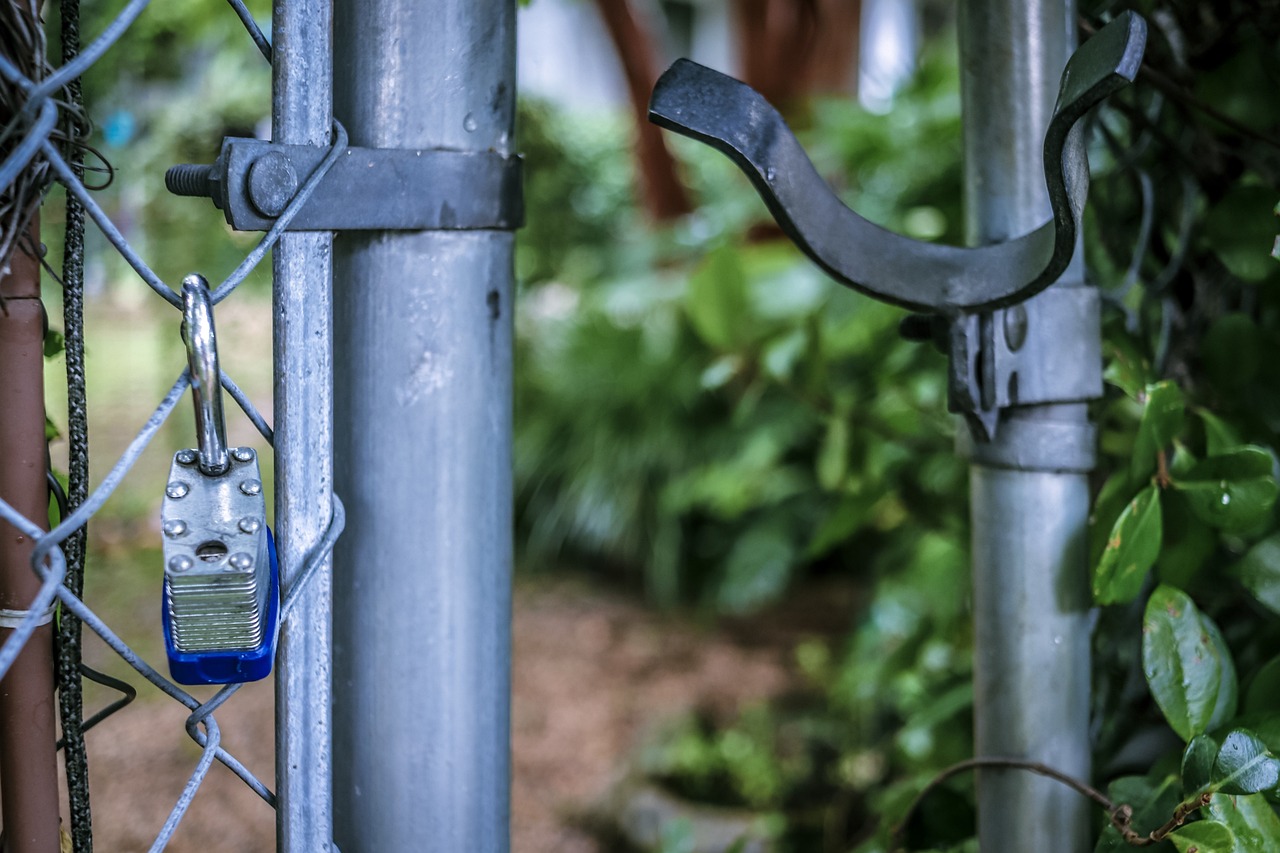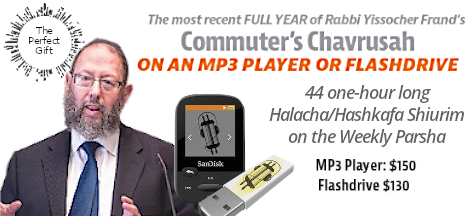
These divrei Torah were adapted from the hashkafa portion of Rabbi Yissocher Frand’s Commuter Chavrusah Series on the weekly portion: #1346 – Minhag Yisroel Torah: The Power of Minhag. Good Shabbos!
Parshas Shoftim contains within it reference to the arei miklat (cities of refuge), to which a person who kills someone unintentionally flees. Rather than receiving some other punishment for taking innocent life, such a person remains in the ir miklat until the death of the Kohen Gadol.
The arei miklat were actually referenced in Parshas Mattos-Massei and even before that in Parshas Mishpatim. The pasuk in Mishpatim says, “And regarding the one who did not aim, but Elokim brought him (i.e., the victim) into his hand, and I will set aside for you a place where he can flee there.” (Shemos 21:13).
The four words “Eenah L‘yado V‘samti Lecha” (brought him into his hand and I will set aside for you) begin respectively with the letters Aleph, Lamed, Vov, Lamed, which spells out the word Elul (the month of the Jewish calendar which precedes the High Holiday Days). So according to those who seek out hidden messages in the Torah, there is some kind of connection between the month of Elul and the parsha of arei miklat.
What is the connection between arei miklat, which involves a person who kills unintentionally, and Chodesh Elul? Many commentaries raise the issue – why does a person who killed b’shogeg (unintentionally) need to be punished with exile to a city of refuge? He did not mean to do it. It was unintentional. Yet he needs to confine himself to exile, which is no picnic. If the Kohen Gadol is a young healthy individual, the unintentional murderer may need to remain in the ir miklat for the rest of his life! Why is that? Why can’t he be given a pass for his one-time mistake?
The answer is that the Torah deems that if a person was particularly careful about human life, this would not have happened to him. For example: A person who is extremely careful about Hilchos Shabbos will not transgress the halachos of doing melacha on Shabbos, even b’shogeg. Shabbos is so serious to him that he takes all necessary steps to ensure that he will not be mechalel Shabbos. Today, a person can buy plastic or metal covers to place over all the light switches in his home. It is not uncommon for a person to walk into the bathroom on Friday night and (forgetting it is Shabbos) flip on the switch. (That is actually probably not even shogeg. It is likely the less culpable category of mis’asek). We can readily imagine the situation of a person who is half asleep and not fully conscious of what he is doing as he turns on the light.
This will not happen to someone who is very careful with Hilchos Shabbos. Such a person will make certain that there is some kind of protection over that light switch on Shabbos because full Shabbos observance is so important to him. The same is true with unintentional murder. If a person is extremely judicious and careful when it comes to human life, it will not happen that chas v’shalom he would kill someone b’shogeg.
This is not an accusation that a person who does kill b’shogeg has committed an intentional crime. But when there is a certain lack of full respect for the sanctity of life, “accidents b’shogeg” are more likely to occur. You may wonder – are there really people out there that do not fully respect the sanctity of life? The answer is: Yes. There are millions of such people. People engage in dangerous activities all the time. Why? It is because they don’t fully respect (lack of chashivus for) the sanctity of life.
This is the lesson we quoted many times over the years. It is the famous Gemara (Avodah Zarah 18a) about the Romans taking Rav Chananya ben Taradion to be burnt at the stake because he was teaching Torah publicly. The executioner asked him, “If I speed up your death by increasing the fire so you will not suffer as much, will you promise me a portion in the Olam HaBo (the World to Come)?” Rav Chananya replied in the affirmative. The executioner immediately increased the fire and removed the wet wool material that had been placed on Rav Chananya’s heart to increase his suffering. Rav Chananya’s soul then speedily left him, at which point the executioner himself jumped into the fire.
There are three Gemaras that are similar to this (Avodah Zarah 10a, 17a, and 18a). At the end of each one, the Talmud makes the same statement: “Concerning this incident, Rebbi (Rabbeinu haKadosh) cried and said, ‘There is one who acquires his portion (in the World-to-Come) in one moment and there is one who needs many years to acquire his portion.'”
Why did Rebbi cry? Was he saying, “Gee.’ I spent my whole life being an honest Jew, and I see that this person received Olam HaBa in one minute. What a waste of my time!”? Chas v’Shalom! Rather, Rebbi saw how much a person could accomplish with one minute of his life. That is why he was crying. In just one minute, this person could change his entire spiritual destiny. That was why Rebbi cried.
We don’t appreciate what we can do with one hour or even one minute of our lives. The Kelemer Maggid gave the following mashal in a shmooze he delivered once by Ne’ilah:
An malach came into a cemetery and gave all the dead bodies one hour to return to life. What did the people do when they arose from the grave?
One person went to his parents and devotedly served their needs. He felt he was lacking in Kibud Av v’Em during his lifetime. Another person ran into the Beis Medrash, took out a Gemara and learned for an hour. A third person gave tzedaka. A fourth person engaged in gemillas chassadim. When the hour was up, they all had to go back into their graves.
The Kelemer Maggid then asked, “And what if someone has more than an hour? And who knows if we even have another hour left in this world?”
The point of this story is that life is precious. Time is precious. This person who killed b’shogeg, who apparently had a lack of chashivus for life, is sent to the ir miklat. Who lives in the ir miklat? The arei miklat are all cities assigned to Shevet Levi – the Leviim live in the arei miklat. What do the Leviim do with their lives? Their lives are devoted to Avodas Beis HaMikdash. The Jew who has killed b’shogeg needs a re-education in the importance of life. The best place to get that is in the arei miklat, which are populated by Leviim, who are the primary Torah teachers of Israel (Devorim 33:10). If you want to know what life is all about, go to the Leviim because they appreciate the chashivus of life
How does this relate to Chodesh Elul? An ir miklat is a physical location. It is geographic in nature. Chodesh Elul is an ir miklat of time. It is the time of the year for a person to reflect on life, the importance of life, and the importance of even individual minutes of life. That should be a person’s focus during Chodesh Elul. We are yet early in the month. Chodesh Elul has just begun. But that is the primary function of this month – to reorient ourselves and to remind us of how precious life is, how fleeting life can unfortunately be, and what we can do with our lives.
In the past, on a number of occasions, a group of Jewish laymen have come from Panama and spent three or four days of Chodesh Elul in Beis Medrash Govoha (BMG) in Lakewood, NJ. They are businessmen who leave their families and their jobs behind them and come to BMG and engage in a program which keeps them busy from morning until night with learning, shiurim, shmoozin, etc. They get a lot out of it, because BMG is a place where people value time. That is why they go there. They gain a greater appreciation of what is really important in life.
That is why Elul – Enah L‘Yado V‘samti Lecha – is the ir miklat of time. Elul is a time for people to think about the importance of time and to ask themselves “What am I doing with the time that Hashem has allotted me?
Transcribed by David Twersky; Jerusalem [email protected]
Technical Assistance by Dovid Hoffman; Baltimore, MD [email protected]
This week’s write-up is adapted from the hashkafa portion of Rabbi Yissochar Frand’s Commuter Chavrusah Series on the weekly Torah portion. A listing of the halachic portions for Parshas Shoftim is provided below:
- 019 – Copying Cassette Tapes
- 109 – Hasogas G’vul: Infringing on Another’s Livelihood
- 155 – Ba’al Tashchis: Cutting Down That Troublesome Tree
- 202 – Melech v’lo Malkah: A Jewish Queen?
- 249 – May A Daughter Say Kaddish?
- 338 – Relying on a Goral
- 383 – Circumstantial Evidence
- 426 – The Mitzvah of Escorting Guests
- 470 – May a Convict Escape?
- 514 – Can a Ger Be a Rosh Yeshiva?
- 558 – Competition Among Teachers
- 602 – Saying Kaddish for 12 Months
- 646 – Cutting Branches of Fruit Trees
- 690 – The Grandson and Kaddish
- 734 – Making a Bracha on a New House
- 778 – “I’m Bar Mitzvah” – Do We Believe Him?
- 822 – Making a Chanukas Habayis for a New Home
- 866 – Saying Yizkor During the First Year
- 910 – Business Competition Asur or Mutar
- 954 – Visiting The Sphinx in Egypt−Is It Permitted?
- 997 – Finding Out The Future: Mutar or Asur?
- 1041 – Finding Out If “It” is a Boy or Girl? A Good Idea?
- 1085 – Killing Innocent Civilians During Times of War
- 1128 – Getting Undeserved Kavod – How Honest Must You Be?
- 1170 – The Electric Blanket and the Power of Chachomim in Our Days
- 1214 – The Danger of Cutting Down a Fruit Tree
- 1258 – Brachos on the Tefillin – One or Two Brachos?
- 1302 – Cutting Down Your Fruit Tree for Your S’chach
- 1346 – Minhag Yisroel Torah: The Power of Minhag
- 1390 – Saying VaYechulu Friday Night in Shul
- 1434 – Yizkor on Yom Tov – Why?; In the First Year? And Other Yizkor Issues
- 1478 – Can Women Be Told Not to Come to Shul In Order to Make More Space for Men During Covid?
- 1522 – Can You Say Kaddish for More Than One Person at the Same Time?
A complete catalogue can be ordered from the Yad Yechiel Institute, PO Box 511, Owings Mills MD 21117-0511. Call (410) 358-0416 or e-mail [email protected] or visit http://www.yadyechiel.org/ for further information.



